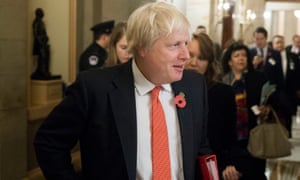
There’s a very nasty smell coming from the back of Mrs May’s fridge
THE GUARDIAN
All
organic matter is rotted by time. Bread grows mouldy. Cheese becomes
stinky. Bananas turn black. Leaders go the same way. Decay is a fact of
power. Prime ministers run out of ideas and road. They become exhausted
and voters weary of their governments. Broken promises, internal
contradictions and accumulated enemies catch up with all but the very
luckiest. Elements of a prime minister’s character that were applauded
as virtues when they first took office are attacked as vices when they
approach the end.
So the unusual thing about this government is not that it is decaying. The distinguishing feature is the rapidity of the rot. Theresa May
has been prime minister for less than 16 months, but her government
already has the reek of camembert that has been at the back of the
fridge for too long.
How strange it is to reflect that her party made her prime
minister because it thought a government led by her would be boringly
dependable. They thought they were commissioning a leader who would give
them grey but competent. Instead, they have got government as rolling
tragicomedy.
In barely more than a week, we have seen the removal of two cabinet ministers and a clamour for the head of a third. The defence secretary has had his stripes torn off because of his conduct towards women. The international development secretary has been sacked
for running a covert freelance foreign policy while in one of the most
sensitive areas of the world, then pretending that she hadn’t, then
having to admit that she had when previous statements were shown to be
false. The actual foreign secretary is only just clinging to his once great office
after endangering the liberty of a British citizen imprisoned in Iran
and then refusing to give a proper apology for this atrocious blunder.
Even by the baroque standards of this administration, that is quite a
triple whammy. There may be more to come. Shivers of fear ripple
through Number 10 that there will be further revelations about other
ministers while they nervously await the outcome of continuing
investigations of the conduct of people who are still, for the moment at
least, members of the government. All of which makes Mrs May’s now
inoperative election rhetoric about being “strong and stable” look more risible by the day.
People
can be heard asking: has there ever been a more chaotic government? I
have been around long enough to remember that similar levels of mayhem
have erupted around previous prime ministers, including some of the
strongest ones. It happened to Tony Blair. It happened under Margaret
Thatcher. What makes this period seem especially anarchic is that there
is no apparent theme to the turmoil. No one has left the cabinet over a
burning issue of high principle. The great question of the hour and the
most demanding challenge for this government is Brexit. When Mrs May
arrived at Number 10, it was widely assumed that the divisions over
Brexit would be the cause of dismissals and the trigger for walk-outs
from her cabinet as they split about which course to take. As it turns
out, no minister has yet quit over Brexit,
though that may well come when the government finally confronts the
crunchiest decisions about Britain’s future relationship with the EU and
how much it is willing to pay for the divorce settlement.
The Fallon and Patel dismissals and the demands for a Johnson sacking
have nothing to do with Brexit. They do not seem to have anything in
common at all. Except one thing. The binding theme is that they have all
happened under Mrs May. This raises a big question that is central to
her colleagues’ calculations about whether she, too, should be fired.
How much is she to blame?
Whenever a minister is swirled by scandal, you can always argue that
fault lies with the prime minister on the grounds that he or she
shouldn’t have had the miscreant in their government in the first place.
This is, it seems to me, an unreasonably harsh benchmark. It would make
it impossible for any prime minister to form a government if he or she
were restricted to appointing only people who could be guaranteed to be
peerlessly competent and impeccably pure at all times. I’m afraid the
voters don’t send enough saints to parliament for that to be a practical
rule.
Sir Michael Fallon was a minister whom Mrs May inherited from David
Cameron. It doesn’t seem fair to blame her for the former defence
secretary’s past conduct towards women. I give her credit for showing
him the door. The case of Priti Patel does raise issues about the prime
minister’s judgment. Mrs May promoted her to international development,
which was a surprise at the time, not least because Ms Patel had
previously argued for the abolition of the department
that she was tasked with leading. To many colleagues, it looked like an
appointment based less on merit and evident qualification to do the job
than Mrs May giving a seat in the cabinet to a right winger who was one
of the prominent Leave campaigners in order to satisfy the hard Brexit
tendency.
There is a more general argument that this unruly government is so dysfunctional because Mrs May can’t get a grip on her colleagues. Ministers are flouting her authority, freelancing on policy and indulging in feuds with each other because she is too enfeebled to curb them. In the words of one former cabinet minister: “The basic problem is that we have a prime minister who is desperately weak.”
The answer, so say a lot of Tory MPs, is for Mrs May to conduct a sweeping reshuffle of her cabinet. It is contended that the way to stop the rot is to have a house-clean of the duds and the suspect. A radical reconfiguration of the senior team would both reassert her authority and allow her to bring on fresh, younger talent from the 2010 and 2015 election intakes who are untouched by scandal. For those pressing this course, it would have the added advantage that it might widen the potential pool of candidates when the time comes for the Conservative party to select a new leader.
When she called the snap election, Mrs May did plan to follow it with a major shake-up of the cabinet. But then she lost her majority and with it so much of her authority over colleagues. A major reshuffle in her reduced circumstances would be pregnant with peril for a precarious prime minister. The cautious side of her nature will be telling her – and it wouldn’t be entirely wrong – that a prime minister in such a brittle position can’t risk making any more enemies than she strictly has to. It seemed like a very good idea to her to replace Sir Michael Fallon by promoting Gavin Williamson from the whips’ office. The expletive-rich reaction to that appointment among furious Tory MPs is an illustration that you only make one friend when you promote someone while you create many foes.
There are also some warnings from history, the most pertinent being the example of Harold Macmillan. By 1962, mould was eating his Tory government, though it had taken more than five years for the rot to set in, rather than just 16 months. He responded with “the Night of the Long Knives” when he dismissed seven of his cabinet, a third of the total, and among them the chancellor. He conceived this as a gambit that would rejuvenate his government and demonstrate that he still had a grip. There was a furious backlash and more scandals followed. He was gone from Number 10, using illness as an excuse for his retirement, the following year.
It would be pretty risky and therefore out of character for Theresa May to conduct her own Night of the Long Knives. So it may be that what we have to look forward to is more Days of the Stinky Cheeses.
Since you’re here …
… we have a small favour to ask. More people are
reading the Guardian than ever but advertising revenues across the media
are falling fast. And unlike many news organisations, we haven’t put up
a paywall – we want to keep our journalism as open as we can. So you
can see why we need to ask for your help. The Guardian’s independent,
investigative journalism takes a lot of time, money and hard work to
produce. But we do it because we believe our perspective matters –
because it might well be your perspective, too.
I appreciate there not being a paywall: it is more democratic for the media to be available for all and not a commodity to be purchased by a few. I’m happy to make a contribution so others with less means still have access to information. Thomasine F-R.
